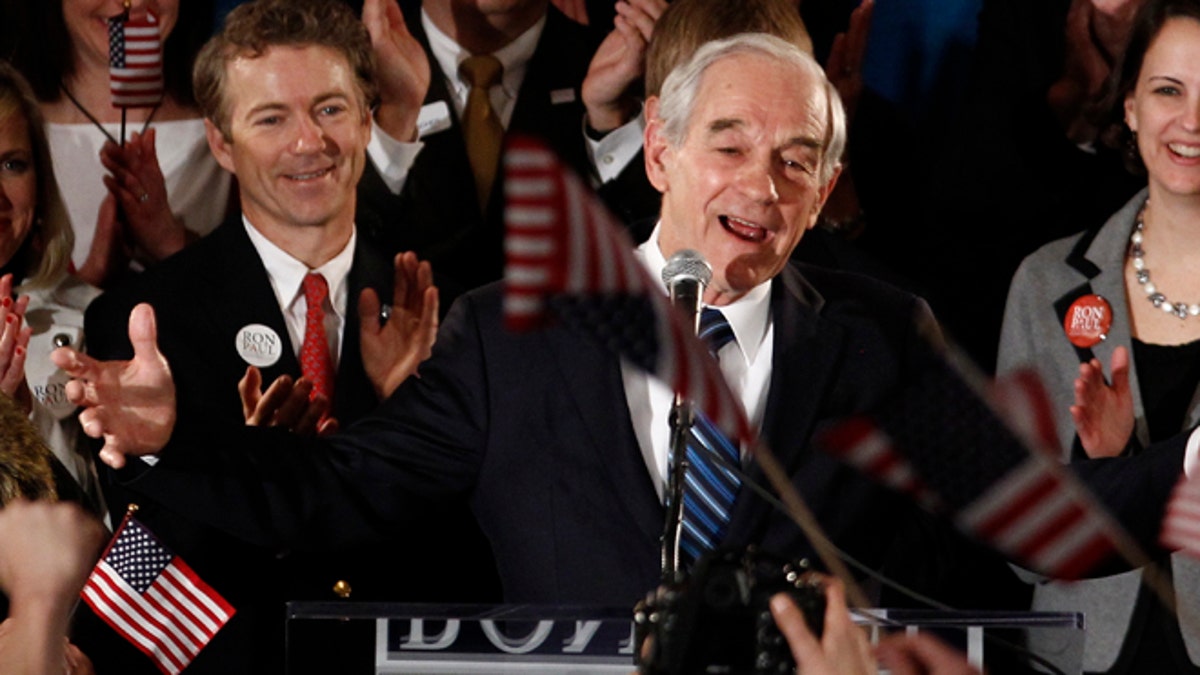
FILE: Jan. 3, 2012: Former GOP presidential candidate Texas Rep. Ron Paul and son Kentucky GOP Sen. Rand Paul at a rally in Ankeny, Iowa. (REUTERS)
Ron Paul has done it again. The firebrand former Texas congressman and GOP presidential candidate is making waves by touting Scotland's recent bid to secede from the United Kingdom -- and the impact it might have inspiring similar movements in the United States.
His views may be no surprise to the libertarian politician's followers. But they pose another potential headache for his son Rand Paul, the Kentucky GOP senator who appears to be assembling the beginnings of a 2016 White House campaign.
The elder Paul -- who mounted presidential campaigns in 1988, 2008 and 2012 -- posted an essay Sunday on his Ron Paul Institute website in which he argued in favor of Scotland voters’ ultimately failed effort to secede. He touted "growing" support for secession bids inside America, and said those who "embrace secession are acting in a grand American tradition."
In an interview with Fox News Radio's Alan Colmes, Ron Paul defended his comments, saying secession is "generating interest as a reflection of the failure of the state" and the Obama administration. But as for his son, Paul made clear "he has his life and his politics."
He said the media sometimes stress the differences between the two of them, and "it's not really enjoyable for me."
But Tyler Harber, Republican strategist and partner in the Harden-Global communications firm, said the father's comments and views could cause issues for the son.
“Unfortunately for Rand Paul, most voters are going to have a difficult time differentiating between his policy statements and those of his father,” he said.
Harber noted that former Florida Gov. Jeb Bush might have “similar baggage” should he decide to launch a 2016 GOP presidential bid, potentially being tied to his father George H.W. Bush and brother George W. Bush.
Rand Paul is already facing a separate political challenge when it comes to the Islamic State threat, considering his non-interventionist views yet polls showing American support for military action.
As the threat from the Islamic State increased in recent months, Paul repeatedly said he opposed the 2003 Iraq war and expressed reservations about a military response. He even paraphrased Reagan administration foreign policy in a June op-ed in The Wall Street Journal by saying U.S. combat forces should be deployed only when the country’s vital national interests are at stake and never without "clearly defined political and military objectives."
In late August, Paul accused presumptive 2016 Democratic presidential candidate Hillary Clinton of having “war hawk” views on Syria when she was secretary of State.
However, within days, and as Americans seem more inclined to target the Islamic State after the terror group beheaded two U.S. journalists, Paul began to sound more hawkish, saying that if he were president he would seek congressional approval to “destroy Islamic State militants.”
A representative for Sen. Rand Paul could not be reached for comment.
Democratic pollster and strategist Ben Tulchin suspects, though, that his father's latest comments will fade quickly -- not reaching the extent to which President Obama had to publicly distance himself from his former pastor, the Rev. Jeremiah Wright, and his inflammatory remarks.
However, Tulchin, president and founder of San Francisco-based Tulchin Research, thinks the comments still could cause problems for Paul should reporters start asking questions as he tours the country with stops in such key early-voting states as South Carolina, where he is this week, and Iowa, where he will again be next month.
“This is not helpful for Paul,” Tulchin said. “Questions about his father’s comments could eventually lead to questions about his own foreign policy, where he doesn’t do well. And even if he’s answering questions for a day, that’s one news cycle.”
Harber has an almost identical take.
“Every minute Rand spends trying to convince people that he doesn’t agree with his father’s statements puts him further behind in the fight for the nomination,” he said. “This is an especially bad sign for a would-be 2016 presidential candidate who is trying hard to attract more mainstream support.”
Another challenge, Harber said, is that father and son are so politically intertwined that they might never be separated.
“There is a lot of cross-over between the supporters of Ron Paul who are now supporters of the younger Rand,” said Harber, also pointing out that veteran operatives of Ron Paul’s presidential bids have stepped into top lieutenant positions in the emerging Rand Paul operation.
“I doubt that Rand can ever effectively distance himself from his father,” Harber said.












































